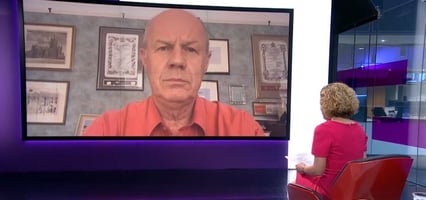The lockdown is gradually easing and more of normal life is slowly returning.
For many businesses, the initial few weeks of lockdown were spent ensuring they could ‘continue as normal’ and figuring out what that new ‘normal’ is.
Eight weeks in and many industries and businesses are moving into a new phase where they look to the future and figure out how they ‘bounce back’ as restrictions are lifted.
For comms, media and marketing teams this means rewriting communications, PR and marketing plans. A lot of work needs to be done to try and stay ahead of the curve and ensure you can be one of the businesses to ‘bounce back stronger’.
With so many changes, it’s hardly surprising that our clients are asking us if we can deliver media, messaging, crisis management and presentations training online.
You may be wondering how online training works. Can it really be practical when you are sat behind a computer screen? Have delegates found it as beneficial as our face-to-face training?
To answer these questions, and others you may have, I thought I would guide you through a few of the training by videoconference courses we have held in the past few weeks.
Media training
It is perhaps no surprise that our training by videoconference has been in demand – spokespeople are having to adapt to interviews being carried out remotely.
And if you’ve watched the news lately, you will have witnessed spokespeople struggle with their camera angles (there have been far too many interviews where viewers have to look up the nostrils of a spokesperson), their internet connections and the customary time-delay that is often a standard feature of a down-the-line interview.
Getting the lighting right has also been an issue for many. I particularly remember one interview with what appeared to be the ghost of Iain Duncan Smith.
“Our next guest is the ghost of Sir Iain Duncan Smith MP” #newsnight pic.twitter.com/Qa6snHRx09
— Victoria G (@missvehg) March 24, 2020
These are challenges we have been helping spokespeople to overcome in our training, together with ensuring they get their message across and are well prepared for the likely difficult questions.
One of our recent online courses saw us deliver training to five spokespeople from WRAP (the Waste and Resources Action Programme) about a new initiative they were preparing to launch.
This happened just as the coronavirus restrictions were being brought in and we had to quickly shift from a face-to-face course to an online one.
The course featured down-the-line television interviews carried out through video conferencing software, where the interviews were recorded and played back for instant feedback and evaluation. Each delegate was also put through their paces with print telephone interviews.
Luisa Pastore, from WRAP, said: “We were really pleased with what we got from the training and how well it worked online. Everyone who took part has provided positive feedback and has clear future learnings.”
We also delivered online media training for Compare the Market. This was a one-to-one course where the delegate wanted help landing messages and dealing with tricky questions.
It featured two down-the-line television interviews, an online print interview, and a telephone print interview.
The course also touched on some online presentation skills.
Susan Bookbinder led the training and said afterwards: “This course was all about adapting to the situation that was unfolding before our eyes as the coronavirus restrictions started to come into place and making sure we prepared the delegate for the types of media interviews she would face.
“One of the most illuminating benefits of this training was the importance of the understanding of lighting and camera angles. As such, I was able to advise the client with some simple changes and techniques to ensure that she was – literally – seen in the best light.”
Presentation skills
There has also been a lot of demand for presentations skills by videoconference courses as people adapt to the challenges of online meetings.
We recently held a videoconference based presentation skills and personal impact course with participants from Nationwide.
The practical session saw two tutors provide training for eight delegates and it included group and one-to-one elements.
Tasneem Siddiqi was one of our tutors on that course. She said: “The delegates all said how much they enjoyed the course. They found it interactive, interesting and engaging and said they learned a lot.
“We build in lots of short breaks on a full day course and offer delegates the option of going offline during the one-to-one sessions, and then returning for their slot - but all my delegates chose to stay online the whole time and were totally absorbed.
“Videoconference sessions are highly practical; delegates are encouraged to interact and ask questions and presentations can be recorded and played back for valuable and immediate one-to-one feedback and evaluation.”
But what did the delegates think?
Dominika Wacniak was one of those who took part and afterwards said: “The online training was a really good idea. I was a bit concerned before about how it would work not being in the same physical space. But it was completely fine. I enjoyed the training, there were no issues with it being online and I would definitely recommend it.”
Another delegate, Matt Brocklehurst added: “The training really opened my eyes to how I present interactively on different formats. I’d previously only focused on presenting face-to-face and not given enough time to how I present on digital formats which I am using more and more every day. I found the day really insightful.”
Online panel debate
Another fascinating project we worked on was hosting three online panel question and answer sessions for the National Union of Students.
This was part of the NUS’ 2020 officer election hustings and was an opportunity for candidates to speak and get their ideas across to the electorate and take pre-selected questions.
We hosted three sessions split by role, with a total of 13 candidates taking part.
Keme Nzerem hosted the session and said afterwards: “It gave each candidate a great opportunity to develop their ideas and get their views across to the electorate.
“If you were not talking, you were asked to turn your microphone off – as it is good etiquette in online meetings – and if you wanted to interject or raise a point you just pressed the hand button on the platform and then I would go to that person at the next opportunity.
“The whole thing felt very managed and gave everyone the opportunity to say what they wanted to say.
“We spent a little bit of time helping each candidate get their set-ups right, but other than that it was simple.”
Christine Milburn, NUS’ Interim Director of Communications agreed. “Participants, observers and the voters all enjoyed the hustings and learned a great deal from each of the candidates due to this format. We were able to cover many more questions, submitted by students, than we initially expected, and everyone got a chance to set out their positions clearly.
“We received some excellent feedback from voters, including many who said that having watched the hustings they were able to make clear decisions on who they wanted to vote for. Others liked that they could watch the sessions back any time before the polls closed, so they could change their minds if they doubted their initial decisions.
“The returning officer was very impressed with how the hustings were held and we will be exploring this as a format for future NUS elections.”
Since the hustings, we have been working closer with NUS and have delivered more online sessions for them.
Get in touch to find out how our bespoke training by videoconference can help you and your teams become better media spokespeople, develop their presentation skills, develop and test messages and improve their leadership communication skills.
Media First are media and communications training specialists with over 30 years of experience. We have a team of trainers, each with decades of experience working as journalists, presenters, communications coaches and media trainers.
Subscribe here to be among the first to receive our blogs.




